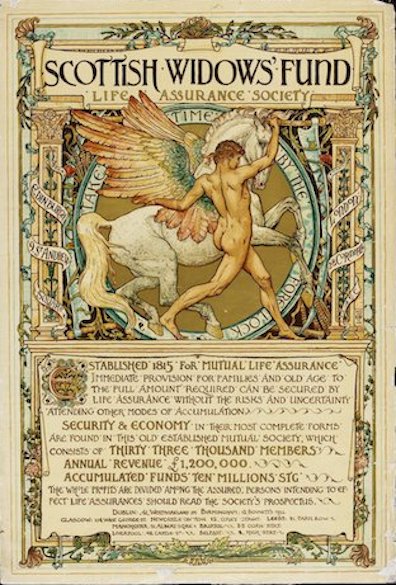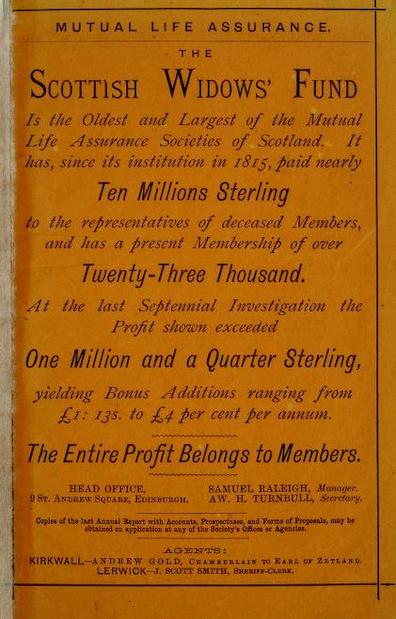In
Sapiens: A
Brief History of Humankind (2011), Yuval Harari narrates
the story of the company's founding: "In 1744, two Presbyterian
clergymen in Scotland, Alexander Webster and Robert Wallace,
decided to set up a life-insurance fund that would provide
pensions for the widows and orphans of dead clergymen. They
proposed that each of their church's ministers would pay a small
portion of his income into the fund, which would invest the
money. If a minister died, his widow would receive dividends on
the fund's profits. This would allow her to live comfortably for
the rest of her life. But to determine how much the ministers
had to pay in so that the fund would have enough money to live
up to its obligations Webster and Wallace had to be able to
predict how many ministers would die each year, how many widows
and orphans they would leave behind, and by how many years the
widows would outlive their husbands" (285).
Being Scots of that country's remarkable Enlightenment era
(memorably explored in Arthur Herman's
How the Scots
Invented the Modern World), Webster and Wallace did not
seek answers to these questions in divine revelation. Instead
they used "several recent breakthroughs in the fields of
statistics and probability," including Jacob Bernoulli's Law of
Large Numbers (which holds that, when very large numbers are
involved, it is possible to precisely predict average outcomes),
and also actuarial tables compiled fifty years earlier by Edmond
Halley from the records of the German city of Breslau (286).
Working with these tools, they calculated what the premiums
would need to be, and predicted that in two decades, "by the
year 1765 the Fund for a Provision for the Widows and Children
of the Ministers of the Church of Scotland would have capital
totalling £58,348. Their calculations proved amazingly accurate.
When that year arrived, the fund's capital stood at £58,347"
(287). In
At Home (2011), Bill Bryson too notes that
Halley's "were the first actuarial tables, and, apart from
anything else, they made the life insurance industry possible"
(480).
In 1815, responding to the great number of families impoverished
by men's deaths in the Napoleonic wars, the Scotsmen's purely
local enterprise became a publicly traded corporation on the
Edinburgh stock exchange, providing financial services to anyone
in the UK. The company grew throughout the 19th century, and at
the time represented in the novel it had an office on
Westmoreland Street in Dublin. Today Scottish Widows, as it is
called, is a subsidiary of the Lloyds Banking Group with
holdings in the range of $100 billion. It is still headquartered
in Edinburgh, but it operates internationally and cover more
than male heads of households.
In
Ulysses, though, this financial services company
fulfills exactly the role for which it was created in 1744:
saving widows and orphans from the disastrous loss of the family
wage-earner. Mrs. Dignam dramatically acts the part in
Circe:
"
She holds a Scottish widow’s insurance policy and a large
marquee umbrella under which her brood run with her,
Patsy hopping on one shod foot, his collar loose, a hank of
porksteaks dangling, Freddy whimpering, Susy with a crying
cod’s mouth, Alice struggling with the baby." In
Hades
Ned Lambert reports that
Martin Cunningham has
been taking up a collection for the family, "
Just to keep
them going till the insurance is cleared up." The task of
delivering these two pieces of news has brought Bloom to
Newbridge Avenue, Sandymount in
the early evening hours before the beginning of
Nausicaa.
What exactly needs to be "cleared up" regarding the insurance
policy? This information is supplied in
Cyclops.
In the bar Bloom tells Joe Hynes that he is looking for Martin
Cunningham to discuss "
this insurance of poor Dignam's.
Martin asked me to go to the house. You see, he, Dignam, I mean,
didn't serve any notice of the assignment on the company at the
time and nominally under the act the mortgagee can't recover on
the policy." "Holy Wars," says Joe, "that's a good one if old
Shylock is landed. So the wife comes out top dog, what?" In
response to this puzzling exchange, Gifford observes that
"Technically under British law, when an individual borrowed
money, mortgaging his insurance policy as security, the mortgage
was not valid unless the insurance company that issued the
policy had been notified. This legal loophole was the source of
considerable litigation, but attempts to void a mortgage based
on the fact that the insuring company had not been notified of
the mortgaging of its policy were rarely successful in the
courts."
This would explain Hynes' reaction: Mrs. Dignam, he supposes,
may be able to avoid repaying the Jewish man who loaned her
husband money because Dignam failed to tell the insurance
company that he had used its policy as collateral. It does not
address the question of what may happen to Mrs. Dignam if the
courts find
for the moneylender, as Gifford notes
usually happened. In that case, presumably the "Shylock" would
sue to recover his funds from the Dublin widow, or, failing that
(since it seems likely that Paddy's drinking will have left
little behind), from the Scottish Widows whose policy backed the
loan.
This prospect would most certainly leave something to be
"cleared up" about the policy. The insurance company would
hesitate to pay out benefits to the Dignam family until its
legal liabilty was known, and if it found that it would be on
the hook for repayment then it would want to reduce or eliminate
the Dignams' benefits. Paddy's unscrupulous listing of his
policy as collateral, then, appears to be threatening the
financial wellbeing of those he left behind.
Bloom apparently has promised to be the one to contact the
company about this matter because he too holds one of their
policies and is familiar with the firm. Ithaca reveals
that he has taken out life insurance with the Scottish Widows
at an impressive level. His desk drawer holds "an endowment
assurance policy of £ 500 in the Scottish Widows’ Assurance
Society, intestated Millicent (Milly) Bloom, coming into
force at 25 years as with profit policy of £ 430, £ 462-10-0
and £ 500 at 60 years or death, 65 years or death and death,
respectively, or with profit policy (paidup) of £ 299-10-0
together with cash payment of £ 133-10-0, at option." Bloom's
purchase of a substantial annuity, banking over the long term
on his daughter's financial security, is not the least
instance of his fiscal prudence, consistent with the habits of Jews and
Scottish Protestants far more than with those of Irish
Catholics.


